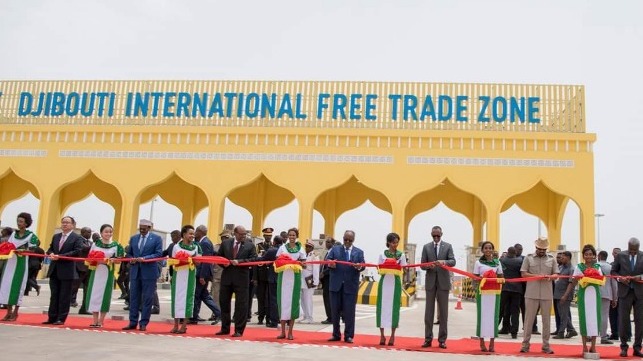

Djibouti’s President Ismail Omar Guelleh now has a deep impression of a Chinese carpenter who lived 2,400 years ago. The opening ceremony of a workshop named after carpenter Lu Ban was held recently in the tiny African nation, during which Guelleh said the workshop will “further enhance the competitiveness of Djibouti through the development of successful young talent.”
The workshop, which is aimed at providing quality vocational training to local people, especially Djibouti’s youth, comes across as being misinterpreted in the US and France. Some people in those countries have the impression that China is trying to cozy up to Djibouti with its money. “Djibouti needed help, China had money, and now the US and France are worried,” said an op-ed piece in Bloomberg.
This line of logic is simple: China pushes forward the Belt and Road Initiative (BRI) by offering a torrent of money, which has resulted in debt distress in the African nation. They believe the rising debt makes Djibouti face the potential of “ceding strategic assets” to China, and such a notion arouses vigilance in Western countries. It seems Chinese money is an important source of concern in the West. This is also the crux of the West’s wariness of the BRI. But if money is the cornerstone of China-Djibouti relations, how should we explain projects such as the Luban workshop, which aims at sharing China’s experience from its own development? Djibouti and the West have very different impressions of China’s presence in the African country.
Economic assistance from China focuses on sharing development experience with African countries by financing projects in fields such as education, infrastructure and people-to-people exchanges. A well-known Chinese proverb says “If you want to get rich, build a road first.” Chinese economic assistance brings development experience to Africa as it finances airports, logistics support bases, and traffic arteries such as the Addis Ababa-Djibouti Railway.
China’s support and assistance come with no political strings attached and do not interfere in African countries’ internal affairs. This practice has developed a new form of economic relations that focus on sharing development experience instead of ideology and political philosophy.
It seems Djibouti has a comprehensive relationship with China, and measuring
By Hu Weijia Source:Global Times Published: 2019/4/8 20:28:41
more recommended stories
 President Irro’s Landmark Visit to UAE: A Diplomatic and Economic Win for Somaliland. Dubai, UAE – Somaliland’s Diplomatic Breakthrough
President Irro’s Landmark Visit to UAE: A Diplomatic and Economic Win for Somaliland. Dubai, UAE – Somaliland’s Diplomatic BreakthroughBy: Abdi Jama President Dr. Abdirahman.
 Kenya’s Unjustifiable Interference in Sudan: A Grave Violation of International Law and Regional Stability
Kenya’s Unjustifiable Interference in Sudan: A Grave Violation of International Law and Regional StabilityBy: Abdi Jama Kenya’s continued meddling.
 𝗙𝗼𝗿𝗺𝗲𝗿 𝗣𝗿𝗲𝘀𝗶𝗱𝗲𝗻𝘁 𝗠𝘂𝘀𝗲 𝗕𝗶𝗵𝗶’𝘀 𝗥𝗲𝗰𝗸𝗹𝗲𝘀𝘀 𝗔𝗰𝘁𝗶𝗼𝗻𝘀 𝗠𝘂𝘀𝘁 𝗡𝗼𝘁 𝗕𝗲 𝗜𝗴𝗻𝗼𝗿𝗲𝗱 – Abdihalim Musa
𝗙𝗼𝗿𝗺𝗲𝗿 𝗣𝗿𝗲𝘀𝗶𝗱𝗲𝗻𝘁 𝗠𝘂𝘀𝗲 𝗕𝗶𝗵𝗶’𝘀 𝗥𝗲𝗰𝗸𝗹𝗲𝘀𝘀 𝗔𝗰𝘁𝗶𝗼𝗻𝘀 𝗠𝘂𝘀𝘁 𝗡𝗼𝘁 𝗕𝗲 𝗜𝗴𝗻𝗼𝗿𝗲𝗱 – Abdihalim MusaYesterday, Somaliland witnessed a deeply troubling.
 ADFD pledges to support Somaliland, after President Irro visit
ADFD pledges to support Somaliland, after President Irro visitThe President of Somaliland, His Excellency.


Leave a Comment